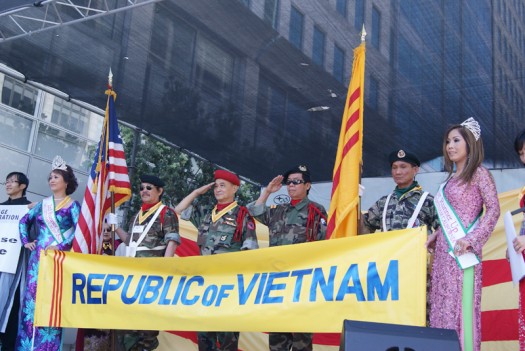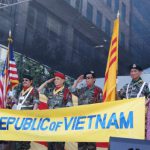Several Vietnamese organizations were part of the Faces of Asia procession at the Eighth Annual Asian Heritage Street Celebration in San Francisco.
With food trucks, cooking demos, a festive parade, two stages of live entertainment, a landmark health awareness presentation, lots of booths to buy both authentic and offbeat Asian-themed merchandise, and much more (Did we mention lots of food?), there was no better place to be for Asian Pacific American Heritage Month than at the Eighth Annual Asian Heritage Street Celebration. Held on May 19th in San Francisco’s Civic Center and Little Saigon districts and produced by AsianWeek Foundation, the city’s largest APAHM celebration was a festive and extremely well-rounded event to bring together Asian Pacific American communities and spotlight Asian cultures. Aside from the festival’s yearly offerings of music, dance, culinary delights, arts and crafts, the Faces of Asia cultural procession, and community networking, the 2012 festival broke new ground in bringing cooking demos by celebrity chefs to foodies and in launching the first-ever National Hepatitis Testing Day.
The festivities opened with a blessing by Thai monks from the Wat Buddhapradeep Temple in San Bruno and followed with the annual Faces of Asia procession, where participants had an opportunity to show off their heritage’s traditional attire throughout the Street Fair boundaries. Some of the specific heritages celebrated this year included Vietnamese, Laotian, Cambodian, Burmese, and Korean. It wasn’t long until the food trucks and stands sold delicious dishes from ramen noodles and octopus balls, to barbecue of the Thai and Hawaiian varieties.
The live entertainment was underway as well, with two stages built for different types of performances. However, festival-goers were treated to the best in local and international talent out of Asian Pacific American communities, no matter which way they went. The main stage at Fulton Street, emceed by “Golden State Warriors Hype Man” Franco Finn, hosted some modern acts, such as local reggae group Native Elements, alternative rock band Johnny Hi-Fi, and rising hip-hop star One Hunned. The Cultural and Jazz Stage was just that, but a definite delight for all. Hosted by Keith O, the stage served as the performance space for such acts like The Francis Wong Unit and the San Francisco Filipino American Jazz Festival.

Martin Yan not only pleased the crowd with his expertise on cuisine, but also with his humorous banter.
A third stage at the end of the street served as the Street Fair’s space to host their first-ever cooking demos from celebrity chefs. Almost every hour, a different chef hopped aboard to mingle with the audience and teach them how to cook one of their signature dishes. The impressive roster of chefs included BBC America’s Kayne Raymond, cookbook author Andrea Nguyen, Steve Cortez, Mari Takahashi, The Slanted Door’s Charles Phan, and TV chef Martin Yan. Yan’s presentation was fun and light-hearted, as he took impromptu audience questions and joked about his age before appropriately presenting the recipe for his Phoenix and Dragon Longevity Noodles. His words of wisdom for the afternoon? “The most important thing is not how expensive or rare the ingredient is—you always cook with the season, with the freshest ingredients,” he said. “Cook simple and healthy food.” He said that he only uses fresh ingredients from California in all his cooking, and let the crowd in on the bit that he would be opening a restaurant, M.Y. China, at Westfield Center in San Francisco soon.
Elected and administrative officials, including San Francisco mayor Ed Lee, and community activists came together at the main stage to educate festival-goers and share personal stories about the importance of getting tested for Hepatitis B and C. California Pacific Medical Center provided free Hepatitis B screenings throughout the day and paired along with the presentation, marked the largest joint testing event in the nation. These inaugural National Hepatitis Testing Day happenings were especially important for the Asian Pacific American community: According to Hep B Free SF, 1 in 10 Asians are chronically infected with hepatitis B, which is responsible for 80 percent of primary liver cancer worldwide.

Community activists and elected and administrative officials came together to celebrate the first-ever National Hepatitis Testing Day.
Other sights worth noting included a children’s play area, an import car show, an Asian Heritage Street Celebration Cinema Showcase presented by the Center for Asian American Media (CAAM), and free admission to the Asian Art Museum, located just in the midst of the festivities. The warm weather for the Saturday afternoon, plus other citywide happenings in the vicinity, attracted a big crowd. Second-year Street Fair volunteer Taffy Shih said that the sight of the crowd itself tends to bring in more people.
“Even if people don’t know anything about the Asian Street Fair, they’ll see a lot of people here, come and contribute, and help raise money,” said Shih.
Angela Pang, the community relations manager of AsianWeek Foundation, has worked on the production of the Street Fair for seven years and said the event continues to be important to foster what it means to be Asian Pacific American.
“I think it’s something you can’t really define, but I think experience, and that’s what the goal of the Street Fair is, to bring all these groups together—Filipino, Japanese, Korean, Thai, Lao, etc.—and show that we’re not a monolithic community and there’s more to being Asian,” said Pang. “Some people hardly ever see Thai monks, or a cultural procession with people in their beautiful ethnic attire. It’s about educating the community about how diverse the community is.”
In witnessing all the cultural displays, the activities available, the wide range of performers taking the stages, the crowd enjoying everything under the sun, and in the community’s bringing awareness and motivating change towards health issues, the Asian Heritage Street Celebration proved once again to be May’s premier event in celebrating differences and each other as Asian Pacific Americans.











